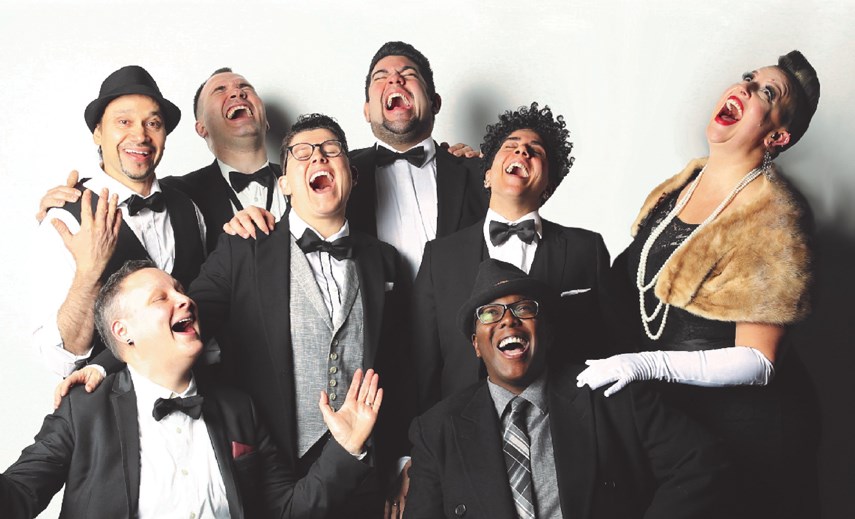Queer as Funk, Commodore Ballroom, Friday, Aug. 3. Doors 8 p.m. / Show 9:30 p.m. (commodoreballroom.com).
Pride is political, she says.
Alison Gorman is the trumpeter for Queer as Funk, a seven-piece cover band who market themselves as: “Vancouver’s hottest, queerest band.” And when the Motown pop/neo-soul septet plays the Commodore Ballroom Aug. 3 it will be more than a point of pride, Gorman says. It will be a political act.
“It’s going to be a big, sweaty beautiful dance party. Furthermore, there’s something important about taking a space like the Commodore on a Friday night on Granville Street and filling it with queer bodies and queer allies.”
Granville can feel intimidating, Gorman says.
“I walk through the world and more often than not I get misidentified as a guy,” she says. “It’s not something that I’m complaining about because it in some ways can afford me a certain amount of invisibility.”
But LGBTQ folks without that measure of invisibility end up hearing catcalls, which is bad enough, Gorman says, but worse are creepiness-laced comments that leave people feeling unsafe.
“We want all of our straight allies to come out and celebrate and be proud,” Gorman says. “It’s important that we get to know each other.”
To help create that familiarity, Queer as Funk will likely pepper their setlist with newer hits like “You Are the Best Thing,” by Ray LaMontagne, soul classics by Aretha Franklin and Etta James, as well as standards from the Motown catalogue.
When discussing Motown – the label that boasted Stevie Wonder, Marvin Gaye, and The Marvelettes – founder Berry Gordy, Jr. said the music was for: “white and black, blue and green, cops and the robbers.”
Choosing to play music that was accessible to everyone was a conscious decision, Gorman says.
“You can’t not dance,” she says.
Gorman first arrived on the North Shore at 13. Sipping her coffee, Gorman describes sitting in the band room at Balmoral Junior Secondary School after moving to North Vancouver from Ottawa. At her old school she’d lobbied to play trumpet because she didn’t want to lug a trombone around. Then she’d learned a scale and not much more.
At Balmoral the music other kids were playing seemed beyond her.
“I wanted to quit,” she remembers.
But her mother – as mothers often do – presented an alternative. She signed Gorman up for the North Vancouver Youth Band under the premise Gorman could quit after two months if she didn’t like it.
“Which was a lie,” Gorman laughs. “I knew that even then. We don’t quit things.”
She eventually studied music at UBC but had less than fond memories of performing in front of a faculty jury.
“They grade you and decide whether or not you’re worthy as a person,” she says. “That’s what it felt like.”
At the urging of a teacher, she switched to Vancouver Community College and found a contrast to the competitive pressure cooker of UBC. She also found a heap of bands in need of a horn player.
“Everyone is constantly asking you to play in their band,” she says, noting she connected with Queer as Funk keyboardist Luis “Babyface” Melgar through VCC.
Queer as Funk evolved out of Leadfoot, “an all-butch choir,” featuring masculine presenting women and trans folks, Gorman says.
The choir was fun but Gorman found herself thinking about Vancouver’s queer community. DJ club nights were fine, but she detected a void. The city needed a dance band that played hits everyone knew and loved. The city needed Queer as Funk.
The name preceded the band.
“The name is so good we have to start a band,” Gorman remembers thinking.
They recruited Dan Shook on saxophone and Jocelyn MacDougal on vocals; and after seeing a wedding video of Connie Buna serenading her wife with an Adele ballad, Gorman knew the band needed Buna.
After five years together, the band recently faced its most arduous musical challenge.
They were participating in Covers for the Cause. The setup was simple: anyone donating $100 to the music therapy in Canada could request the band play any song and they would play it. Any song.
“We have a friend of the band that has been bothering – not bothering but pressuring us, shall we say, to play some Justin Bieber,” Gorman says.
The friend donated $100, leaving the band to pay their bill by performing Bieber’s “Sorry.”
They had to keep the tune, but what else could they do?
Drummer Sally Zori suggested a new beat. Guitarist Marc Van Rosi started playing a groove from Michael Jackson’s “Human Nature.”
It worked. And all of a sudden an obligation became exciting.
“Obviously we have to do that, we need to make this song cooler,” Gorman remembers thinking.
“Don’t get me wrong, I love the Biebs,” Gorman says. “But let’s make it our own.”



